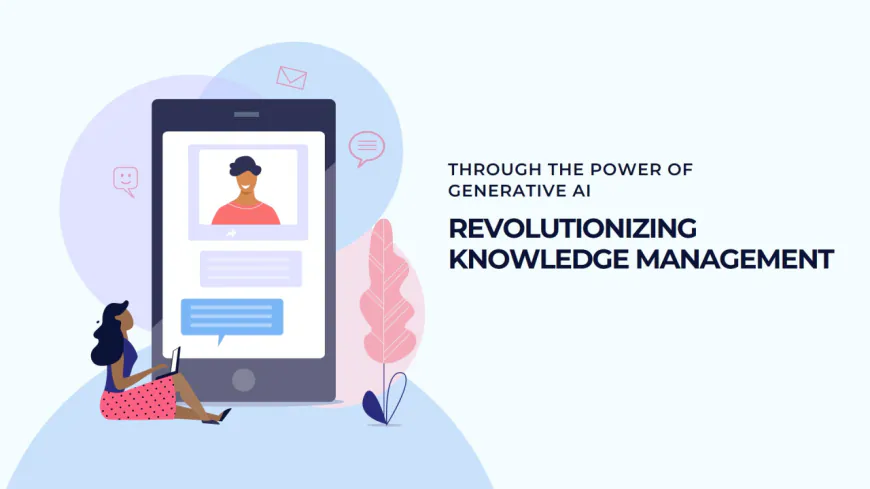Generative AI: Revolutionizing Knowledge Management and Operational Efficiency
As businesses expand and evolve, they accumulate vast amounts of data. Over time, this data often becomes fragmented, siloed, and difficult to access. According to recent research, knowledge workers spend more than eight hours a week simply finding and interpreting the information they need to perform their jobs.

As businesses expand and evolve, they accumulate vast amounts of data. Over time, this data often becomes fragmented, siloed, and difficult to access. According to recent research, knowledge workers spend more than eight hours a week simply finding and interpreting the information they need to perform their jobs. However, with the rise of generative artificial intelligence (Gen AI), these challenges are being addressed. Drawing on my 10 years of experience consulting on digital transformation and AI adoption in large enterprises, I have witnessed firsthand how Gen AI can streamline knowledge management and significantly boost productivity.
The Role of Generative AI in Business Efficiency
Generative AI holds great promise for transforming how companies manage their data. One of the most effective ways to leverage AI for operational efficiency is through generative business interfaces. These tools allow users to interact with company databases using natural, conversational language, bypassing the limitations of traditional keyword-based searches. These interfaces are powered by large language models (LLMs) that use natural language processing (NLP) to understand a user’s intent, providing personalized answers by combining relevant information from multiple data sources.
The banking industry is a great example of Gen AI's potential impact. McKinsey & Company estimates that Gen AI could improve operational efficiency in this sector by as much as 5%, leading to cost savings of $200 billion to $300 billion. This significant improvement stems from Gen AI’s ability to enhance search, streamline processes, and automate content generation based on company-specific data.
Major Players in the Generative AI Space
Many enterprise resource planning (ERP) providers are capitalizing on this technology. Companies like Microsoft Copilot, Salesforce Einstein, and HubSpotAI have introduced generative interfaces that seamlessly integrate with their platforms. Additionally, third-party providers such as Coveo, Bloomreach, and Algolia are also making waves in the market. Newer entrants like Glean and Hebbia have attracted significant funding, with Glean securing $200 million in March 2024 and Hebbia raising $130 million in July 2024.
According to a Google study, business leaders believe that generative AI can enhance operational efficiency in various areas, including customer service, commerce, creative tasks, and supply chain management.
SaaS vs. API: Choosing the Right Generative Interface
When selecting a generative AI interface, companies often choose between SaaS (Software as a Service) platforms or API (Application Programming Interface) solutions. SaaS offerings are ideal for organizations that want to quickly adopt generative interfaces with minimal implementation time. These platforms typically come with pre-configured features that support routine tasks, such as search and content generation.
In contrast, API-based solutions are better suited for companies requiring custom features or specialized training. These offerings allow businesses to integrate generative AI capabilities into their existing systems, providing more flexibility and advanced model customization. APIs are particularly effective for product search and discovery, offering businesses the ability to tailor their generative interfaces to their specific needs.
Pricing and Vendor Selection
Generative AI solutions are available at a wide range of price points. Many vendors offer freemium models, which include free usage up to a certain limit of search queries. For larger enterprises, subscription-based or pay-as-you-go models are common, with costs ranging from a few hundred dollars per month to hundreds of thousands of dollars per year for fully customized solutions.
When choosing a vendor, businesses can also decide which LLM database to use. Popular options include OpenAI’s GPT-4, Google’s Gemini, Facebook’s LLaMA, and Anthropic’s Claude. Each offers distinct advantages depending on the use case, with GPT-4 known for its versatility and Gemini for its seamless integration with the Google ecosystem.
The Future of Knowledge Management with Gen AI
Generative AI is not only revolutionizing knowledge management but also enabling real-time, accurate insights through retrieval-augmented generation (RAG). This technology ensures that information is always up-to-date and traceable to its original source, making it easier to verify and act upon.
As businesses continue to adopt Gen AI solutions, they will enjoy improved operational efficiency, better decision-making capabilities, and a more streamlined approach to managing and leveraging their data.

 Bajrang Sharma
Bajrang Sharma